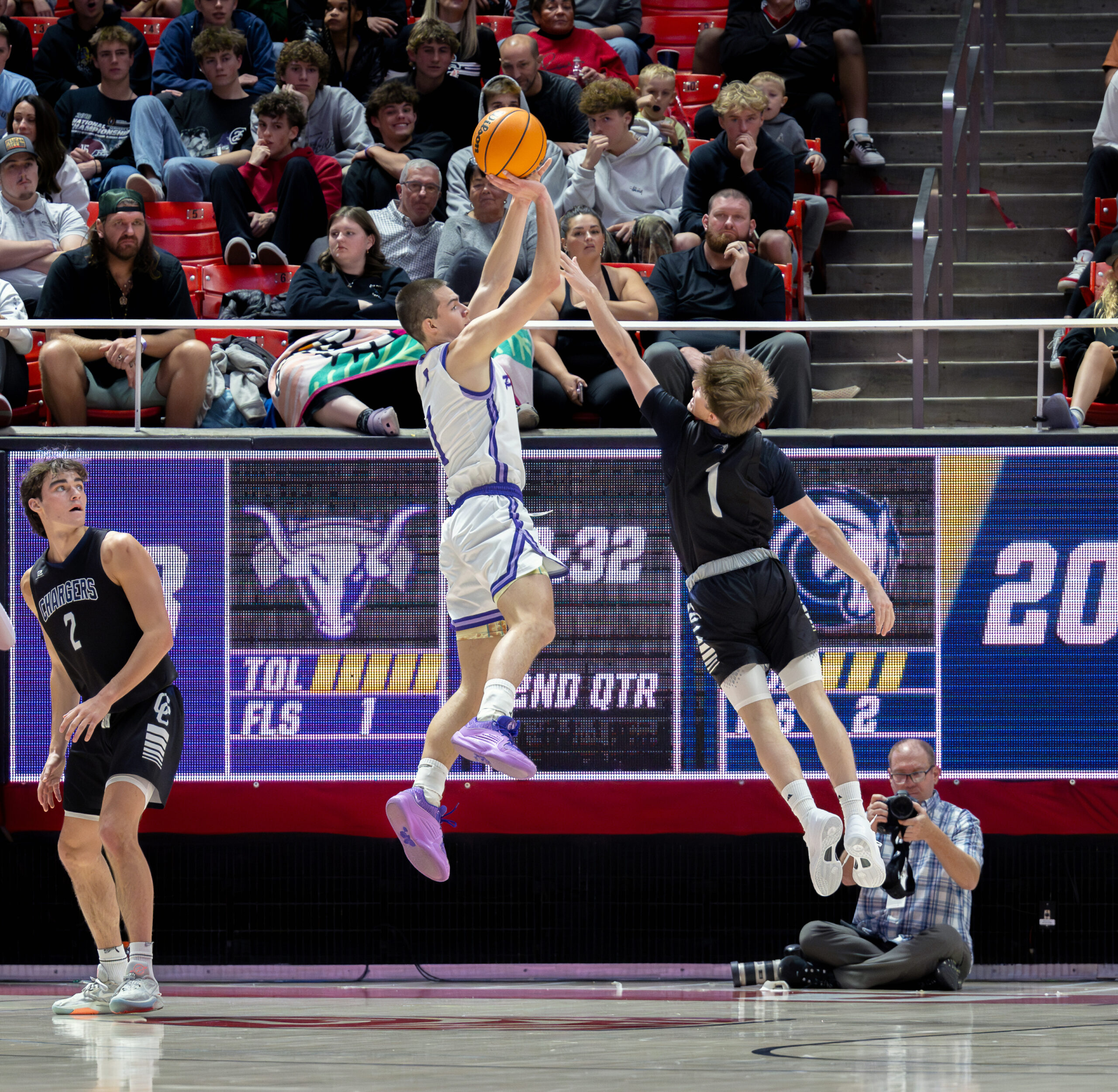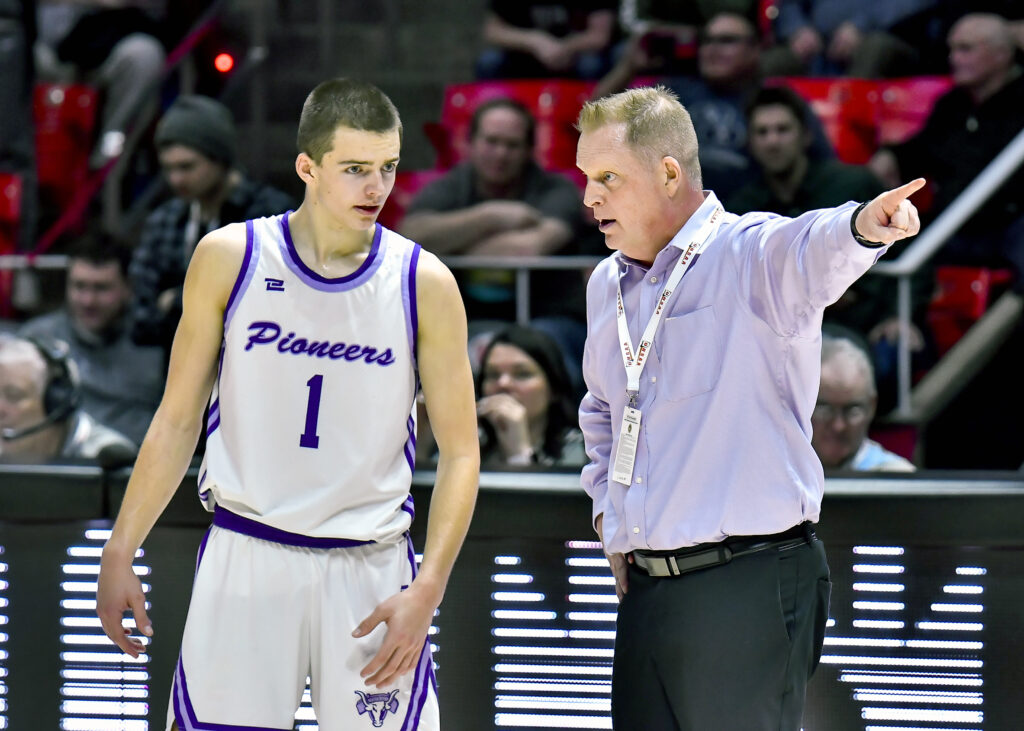Opinion
OPINION: Lehi’s Cooper Lewis was a prep hoops wizard for the ages
Published
2 years agoon
By
Beky Beaton
School is done for the year. The final sports trophies have been awarded, the seniors have graduated, and the dust has settled from those last few hectic weeks of competition.
Now we can finally take a deep breath and put some perspective on one of this year’s most triumphant storylines.
I’m talking about the apotheosis of Lehi boys basketball player Cooper Lewis.
If you’ve been paying attention, you already know that he led the Pioneer hoops team to the 6A state championship, the school’s first in any sport at Utah’s highest level of competition.
He earned numerous awards, including the state’s most prestigious honors of being named Mr. Basketball and the Utah Gatorade Player of the Year for boys basketball.
In doing so, he joined the ranks of some of his father’s most famous program alumni – players with last names such as Haws and Emery. I covered the prep careers of them all, and Cooper was every bit as good in his role as any of them.
Originally committed to a junior college program, Cooper suddenly started getting more recruiting attention from teams across the country after the season was over. He ultimately chose Saint Mary’s College in California.
The Gaels are fourth overall in most NCAA D-1 wins over the past 13 years and the outlook and culture of the program match Cooper’s values, making it a perfect fit for both sides.
He will join the SMC roster in 2026 after completing his service in the Oregon Portland Mission for the Church of Jesus Christ of Latter-day Saints, which he will begin later this month.
But those facts don’t tell anything close to the whole story.
First of all, this was a very rich year for boys basketball in Utah, particularly in the top two classifications. In Class 6A, there were six teams with an obvious legitimate chance to win the state title, among them Lehi’s Region 3 co-champion American Fork, plus Herriman and Corner Canyon – the teams that the Pioneers had to beat in the semifinals and finals to claim the gold trophy.
On top of that, there were an unusual number of high-profile players who were coach’s sons this season. Such players often benefit from the extra resource of having a successful coach as a father, though people sometimes forget that the kids still have to do the work to benefit from that resource.
Cooper is the supreme example of this talented group as the son of former Lehi head coach Quincy Lewis. Together with a unified team, they added the 13th boys basketball championship to Lehi’s storied history, and Quincy got his ninth title as a coach, more than anyone else in this sport in state history.
Other notable names in the coach-son category included 5A Player of the Year Jordan Barnes of title winner Olympus, son of four-time state champion coach Matt Barnes, and Region 3 co-MVP Tiger Cuff of American Fork, son of four-time state champion coach Ryan Cuff. There were others as well.
All of this is to say that Cooper and the Pioneers excelled during a time when the competition was really, really good, which makes their 23-4 record even more impressive. Few teams in state history have won that many games in boys basketball.
Cooper also earned spots on the UHSAA record lists this year in two places: he’s now fourth all-time in season 3-point shots made and 10th all-time in season scoring.
There are only three other Lehi players in the state records book, each of them with a single mark to his credit. Cooper’s also just the fifth Pioneer ever to appear on an All-State team for three consecutive years.
Keep in mind that Cooper didn’t score a single point in a varsity game his freshman season, when he sat at the end of the benchof the 2021 championship squad. He averaged 10.8 points, 2.5 rebounds and 2.9 assists per game in 13 JV appearances that year.
His sophomore season was another matter. Cooper played in all 21 varsity games and averaged 18.3 points, 2.3 rebounds and 3.0 assists per game with 56 treys, 48 steals and four blocks. He converted 84.9 percent of his free throws.
He was in every game as a junior too, but now with more attention from opposing defenses. He still tallied 18.4 points per game and bumped up his other averages to 4.4 rebounds and 4.5 assists with 87 steals and nine blocks.
As a senior, despite an off-season injury that sidelined him for months plus some illnesses and nagging issues during the prep year, Cooper’s very personal and protracted labors to improve his strength, endurance, agility and verticality plus his skill execution manifested themselves in unignorable ways.
He played in every contest and averaged 27.3 points, 4.4 rebounds and 4.0 assists per game with 110 triples, 54 steals and 11 blocks. He still shot 84.8 percent at the line – and he was fouled a lot. He was awarded 145 free throws this season. Plus, when the games were close, he never left the floor.
Once Lehi began the league tilts in Region 3, which was widely considered the state’s toughest region, Cooper netted 31.3 points per game along with averaging 4.5 assists even though he wasn’t a full-time point guard, all the while as opponents tried every defense they could think of to slow him down.
During the state tournament, Cooper converted 47 percent of his field goals, including 42 percent from long distance, plus dropped in his consistent 84 percent from the charity stripe.
He averaged 28.3 points, 3.3 rebounds and 5.0 assists per game against the best that Utah had to offer. Even when, by then, everyone knew what he was capable of.
Now let’s look at his imprint on the Lehi program.
Cooper’s name appears in the detailed Pioneer records book in an astonishing 45 places. It won’t be surprising that he holds seven of the top 11 marks in individual game point totals, but that’s just the tip of the iceberg.
He owns the No. 1 spot now in 13 different categories: 3-point shots made, free-throws made percentage and steals in a game; points total, points average, 3-point shots made, 3-point shots average, steals and steals average in a season; plus career totals in points, 3-point shots, assists and steals.
In fact, the only record categories in which his name doesn’t appear at all are season rebounds average and career blocks – not surprising for a 6-foot-2 guard.
It would be hard to escape the conclusion that Cooper is the most impactful boys basketball player to ever wear a Lehi jersey. There were certainly others who were more effective in individual aspects of the game, but not as a total package.
Those gaudy numbers show both the breadth and depth of Cooper’s talent. They also suggest the almost unimaginable amount of effort required to reach them.
He wasn’t just a gifted generational scorer; he was also an excellent passer, a relentless defender, an opportunistic rebounder and a consummate teammate.
Cooper demonstrated all the intangibles too: an indefatigable work ethic, toughness (mental, physical and emotional), court smarts, leadership, focus, determination, discipline, drive and an unfettered desire to win. His respect for the game was tangible and his joy in playing it was infectious.
It wasn’t that he was perfect. Like all players, he missed some attempts, committed turnovers and other errors, occasionally made poor decisions on the floor and had nights when his shots weren’t falling like they normally did.
However, he learned from his mistakes, adjusted his game approach as the circumstances required, accepted direction and correction from his coach/dad and others with humility, and was clearly conscious of how his example affected others. He inspired everyone around him to be better.
Like all ultra-competitive kids, he had an ornery streak too, but Inever saw him lose control of his emotions in a game. He took pains to show good sportsmanship and said the right things in interviews. He never got too full of himself, and never quit working to improve.
He was also someone the team could count on when the chips were down, whether that meant sinking the clutch shot or making a steal etc. when they needed one; or, trusting his teammates by getting them the ball when they were in a better position to get the needed job done than he was.
Cooper played the right way, without shortcuts, and worked hard to build relationships with his teammates that allowed them to achieve their lofty aspiration of unity – which in turn helped them to prevail against bigger teams with star-studded lineups right up until the final goal that they craved more than anything else was achieved.
Lehi’s success in basketball goes all the way back to the beginning of the sport in Utah high school athletics more than a century ago. There have been many great Pioneer players in the past, and there will be more in the future. Some of them are already in the pipeline.
All that being said, I hope you enjoyed watching Cooper perform while he was here.
You’re unlikely to ever see another player again at this level who understands the nuances and executes the skills of the game so spectacularly well.



